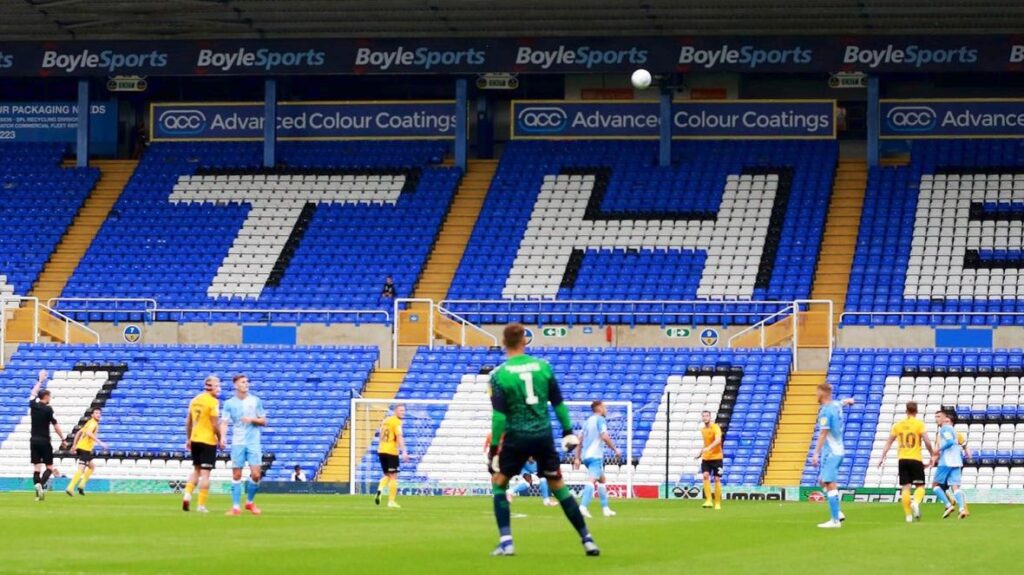So, as ever, despite the extreme ‘all or nothing’ attitudes we carry around these days, the answer has to be somewhere in-between. There has to be some middle ground where we have to live with the virus in some capacity (at least until a vaccine is ready) and there are some acceptable risks taken that allow institutions, organisations and individuals to go on.

Several Wrongs Do Make A Right Mess Of UK Sport: Part 2

Darren Young
@fanexperienceco
Darren has spent four years working for The Fan Experience Company and is a UEFA Mentor. He is responsible for assessment reports that in 2019/20, went to over 200 clubs in 13 countries.
He has a background in working on customer service excellence projects in the UK and Europe, and an MBA that included studying customer service in the USA .
The sportswriter eagerly gets the words down to turn ‘prepare for a difficult winter’ into the story that will eventually have the headline ‘no fans at games until March.’
It’s definitely a scare story, although it may well turn into a real living nightmare, that will attract clicks and views, regardless of its final accuracy and is designed to attract attention now, and feed into the climate of fear and uncertainty that’s currently gripping the country and, indeed, most of the world.
But then, reality strikes, and 20 of the 72 clubs go bust immediately, followed by another 17 in the following months. The rest are hanging on for dear life but some others eventually fail with no income and all emergency funds exhausted. The clubs left can barely fill one division.
The organisation that used to fill several pages and online columns with stories and match reports has much less to write about now. The sportswriter is one of those to lose their job.
Talk about short-termism!
Overhyping the hype? Officials have already admitted that the ‘50,000 infections per day’ was not an estimate or prediction but a deliberately overblown number to try to get attention and make people follow the rules. But just as the public attitude to them changed after Dominic Cummings did his own thing, so their adherence to the measures will dilute when they know they are being taken for fools by politicians and scientists alike.
But most clubs won’t be able to hang around waiting until next Spring anyway. This announcement is the equivalent of pushing some heads under water. There will be more fight now; there has to be, as the alternative is to go under and not come back up. Owners, directors and fans won’t let that happen to their clubs without a struggle and I expect to see a concerted and joined-up pushback from these groups before long, in the way the airlines railed against quarantine rules that would see them go out of business.
But all arguments quickly turn into a question of health versus economy. It’s an over-simplified angle that doesn’t work so easily in real life.
We obviously cannot ignore the virus; it’s killed too many already to do that and letting thousands more die so the remainder can work isn’t a plausible option. But neither can the whole UK economy be allowed to crash and burn so that tens of millions don’t have jobs be allowed either. There is a fallout from that which would impact on countless more as widescale homelessness and increases in crime and civil unrest would present a price that simply isn’t worth paying.
We have to remember, also, that this is not March. The numbers are currently much smaller and we also now have a roadmap to follow in terms of hospitals, care homes, medication and restrictions; not just our own but that of countries who have dealt with it more successfully than we have.
Yes, the mistakes that have been made so far in the UK are humiliating, but surely we can’t go on making them. You don’t fall into the hole the person in front of you just fell into. Or you shouldn’t, anyway.
I think we need someone to take control – not a beaten, broken man who can’t get by on £155,000 and with ‘only one’ cleaner – and there have to be candidates in the private sector who could come in from the outside and navigate football and sport through this crisis. Someone who is independent and can look at it from a wider perspective and not a vested interest, not an un or under-qualified minister.
Of course football club owners want fans back. Of course scientists want 100% safety, although why Neil Ferguson continues to give us his lockdown theories when he couldn’t stick to them himself is beyond me, and fans themselves want to go to games. And of course someone who doesn’t like football won’t give a damn what happens to it.
But beyond self-interest, there has to be a view that looks at this in widescreen. And the long term.
The numbers of people dying from coronavirus are currently low – lower than the figures for both breast cancer and prostate cancer and the numbers of people who will die as a result of slow-growing cancers and other illnesses in the coming years who were unable to get treated, or even diagnosed, will dwarf all of these in the years to come.
And that’s before we even get to the number of suicides.
The impact on mental health is still largely unknown in all this and may not be fully understood for a decade, but it will be gigantic. It’s a hidden killer that we can’t fully comprehend but will be partly made up of those who lose jobs, cannot find new employment, are not able to see people during the crisis and those who’s health deteriorates in other ways because of the sanctions.
In that respect, local sports clubs as well as grassroot participation and facilities are a vital component in their communities and the public health within it. Obesity has been earmarked as one of the biggest dangers to health during the pandemic, but it was one already. Sports clubs and their facilities offer another way for local people.
As we saw a year ago, and only last week, the loss of Bury and Macclesfield Town (although not related to Covid), create a hole in the community and people lose jobs at the clubs and in businesses that survive from match day footfall. Their families suffer too, meaning that the loss of one club in the lower or non-league structure devastates thousands of people when you include the fans for whom they were a big part of their daily lives. If several clubs begin to go under as a result of these latest restrictions, then we’re talking about a major social and mental impact on a massive scale.
So when people say the decisions to lockdown or keep stadiums closed are right because it keeps people safer, they also need to consider the many thousands who might be safer today, but who will be irreversibly affected by it tomorrow. Or the day after that.
We’ll eventually beat the virus.
But by then, it might already be too late.
Our White Paper ‘It’s Just Like Watching Pret’ can be viewed by clicking here
© The Fan Experience Company 2020
